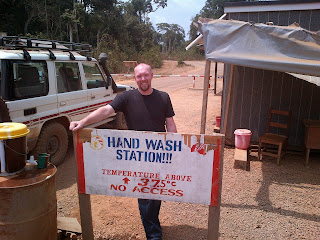I have invited my husband to guest blog. He recently returned from his second trip to Liberia so he will undergo his second 21-day observation period for potential Ebola. He was not exposed. We are not afraid, but the view from his lens is poignant, lovely, and worth sharing. Here is his submission.
It was hot. I was wearing jeans, boots, and two t-shirts (one to catch the sweat before soaking through the outer shirt) thinking I would be comfortable in the air conditioned land cruiser that would take my team and me into the countryside of Liberia to retrieve generator parts from a local gold mine. I sat in the front seat with my knees nearly pressed to the dash leaning into the stream of semi-cold air narrowly escaping the vents. Despite my efforts, my outer shirt was soaked.
Throughout the journey my Liberian colleagues would explain the historical significance of each intersection, bridge, and village we passed. Many of the explanations revolved around the horrific events of a twenty year civil war. We approached an intersection and one of the Liberians said that this spot was very dangerous. There were people being shot in the intersection as they were trying to get to and from their homes. Other times he would describe the check points that were prior to bridges, roads, and the self-proclaimed border regions surrounding the city of Monrovia. You were lucky to get across a bridge or out of the city he explained. He spoke of the worst human atrocities one can imagine.
As we ventured further from the Monrovian border our progress would be slowed by large pot holes in the streets, goats crossing, pedestrians dangerously close to moving vehicles, and motor bikes darting from here and there with little respect for caution.
We came to the first of many police check points and moved through without issue. We were traveling in an American plated vehicle and Liberians love Americans. Some officers would salute while others would wave and smile. At the second checkpoint the guard lowered the tow strap to allow us to cross. Just as we began to pick up speed on the other side, another officer came running alongside the vehicle telling us to stop. I rolled down the window, said hello, and questioned the misunderstanding. The officer said even though we have American plates and are free to proceed, no one is allowed to continue without washing their hands! We all quickly complied by getting out of the car, walking to the bucket of bleach water, rinsing our hands, and having our temperatures taken. This is just one of the many ways Liberians are being proactive in the fight against Ebola.

At the last of the checkpoints I was returning to the vehicle and heard a group of children calling out what sounded like “wave at me!” I ignored the commotion at first thinking that it was a ruse to try and sell something from their roadside stand. When I asked for clarification from my Liberian colleagues they explained that the children were yelling White Man, White Man. I turned back around, gave a big wave and said “Hello Kids!” Beaming smiles of joy and excitement stretched across their faces.
To say that I was humbled by this experience would be severely understated. We passed village after village and hut after hut that appeared to be abandoned or unfinished, only to discover that people were inhabiting these types of places. There were children rolling tires and playing with soccer balls that looked like balls of yarn, clothes hanging from wire or string or laying on the ground to dry in the sun, men sleeping in hammocks made of old ratchet straps, and women cooking in open pits. Some houses were made of brick while others were made of mud, cinder block, thatch, or even plain palm branches. Most places had a central well pump for water and were without electricity. Although, there were a few villages with generators powering wires that were strung in the air on hand made poles or trees which couldn’t have provided power to more than one or two lights in a few of the homes.
In the distance ahead I could see a group of people gathered near the roadside. This was not anything unusual but I did notice a collection of buckets and tubs lining each side of the street. As we came closer I could see women leaning over the buckets washing their laundry using the water from a roadside stream. Many of the women were topless because of the need to wash the shirts they were wearing. To protect their dignity and maintain some sort of decency, when the vehicles were close enough some women would cross one arm in front of their breasts to keep from exposing them to the passersby. Others, however, stood with no shame as they continued with the task at hand. We continued on passing palm trees with coconuts, pineapple bushes, and rubber trees all while being tossed side to side traversing the local dirt road.
The ride home was different. I saw the huts and villages with new eyes. I tried to put myself in their homes, among their people, wearing their clothes, drinking the water from the well, and having virtually nothing. It was difficult to imagine. Then to add the torture of a twenty year civil war, being forced from my homeland, and now struggling with the overwhelming devastation of Ebola, it seems beyond any one man or woman’s capability. Yet the people of Liberia live on.






